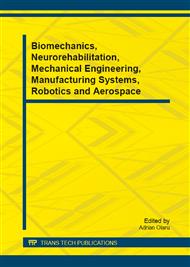[1]
Gesellschaft für Tribologie e.V. 2002. GfT Arbeitsblatt 7: Tribologie - Verschleiß, Reibung, Definitionen, Begriffe, Prüfung (GfT, Moers). In German.
Google Scholar
[2]
H. Czichos, K.-H. Habig, Tribologie-Handbuch; Reibung und Verschleiß, 2nd edition. Weisbaden: Vieweg. In German, 2003.
Google Scholar
[3]
M. Koucky, D. Valis, Suitable approach for non-traditional determination of system health and prognostics. Zeszyty naukowe, Styczen – Marzec, Vol.1, No 159, pp.123-134. ISSN 1731 – 8157, 2011.
DOI: 10.5604/01.3001.0002.2884
Google Scholar
[4]
M. Koucky, D. Valis, Deterioration Dependability Diagnostics. Revised by J. Čáp, V. Píštěk, F. Pešlová. Brno : handsdesign, Section II., Diagnostics – on approaches for non-destructive diagnostics, pp.77-86. ISBN 978-80-254-8377-0, 2010.
Google Scholar
[5]
J. Lippay, Tribological diagnostics of heavy of road lorries Tatra 815 engines which operate with OA-M6 ADS II oil. Inauguration Thesis, Brno: Military Academy, 1991. In Czech.
Google Scholar
[6]
E.H. Mamdani, Applications of fuzzy logic to approximate reasoning using linguistic synthesis, IEEE Transactions on Computers, Vol. 26 (1977)., No. 12, 1182-1191.
DOI: 10.1109/tc.1977.1674779
Google Scholar
[7]
J. Stodola, Combustion Engines Wear and Degradation Processes Modeling. EAEC – European Automotive Congress. Beograd, 2005.
Google Scholar
[8]
J. Stodola, Model of Lubricating Oil Filling-up, Modification, and Degradation in the Combustion Engines. Tribology, Eslingen: SRN, 2004.
Google Scholar
[9]
L.A. Zadeh, Fuzzy sets, Information and Control, Vol. 8, pp.338-353, 1965.
Google Scholar
[10]
Sugeno, M. Industrial applications of fuzzy control, Elsevier Science Pub. Co, 1985.
Google Scholar
[11]
J. Stodola, Wear Particles Identification and Modelling Degradation Processes of the Combustion Engines Possibilities. Symposium "The Control and Reduction of Wear in Military Platforms". AVT-109. Williamsburg, Virginia, USA, Paper Reference MP-AVT-109-11, www.rta.nato.int/Reports.as, 2004.
Google Scholar
[12]
M. Zajac, D. Valis. Fundamental risk assessment in example of transhipment system. Reliability & Risk Analysis: Theory & Applications, [online]. March, Vol.1, No 1, pp.56-64 [cit. 2010-03-16]. ISSN 1932 – 2321, 2010.
Google Scholar
[13]
D. Valis, L. Bartlett. The Failure Phenomenon: A Critique. International Journal of Performability Engineering, [online]. March, Vol.6, No 2. pp.181-190 [cit. 2010-03-16]. ISSN 0973 – 1318, 2010.
Google Scholar
[14]
J. Stodola, Machines Wear and Degradation Processes Modelling. International Conference Transport Means, 27-30. ISBN 9955-09-735-3 Kaunas : Lituenia, 2004.
Google Scholar
[15]
D. Valis, M. Mlynczak, T. Nowakowski, How to manage risk? An approach based on standards. Maintenance problems, vol. 1, no. 80, pp.137-148. ISSN 1232-9312, 2011.
Google Scholar


